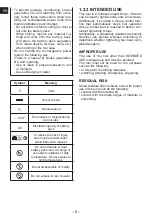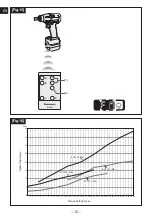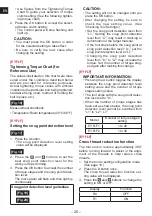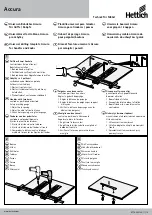
‒ 6 ‒
EN
EN
h) Keep handles and grasping
surfaces dry, clean and free from oil
and grease.
Slippery handles and grasping
surfaces do not allow for safe handling
and control of the tool in unexpected
situations.
5) Battery Tool Use and Care
a) Recharge only with the charger
specified by the manufacturer.
A charger that is suitable for one type
of battery pack may create a risk of fire
when used with another battery pack.
b) Use power tools only with
specifically designated battery
packs.
Use of any other battery packs may
create a risk of injury and fire.
c) When battery pack is not in use,
keep it away from other metal
objects, like paper clips, coins,
keys, nails, screws or other small
metal objects, that can make a
connection from one terminal to
another.
Shorting the battery terminals together
may cause burns or a fire.
d) Under abusive conditions,
liquid may be ejected from the
battery; avoid contact. If contact
accidentally occurs, flush with
water. If liquid contacts eyes,
additionally seek medical help.
Liquid ejected from the battery may
cause irritation or burns.
e) Do not use a battery pack or tool
that is damaged or modified.
Damaged or modified batteries may
exhibit unpredictable behavior resulting
in fire, explosion or risk of injury.
f) Do not expose a battery pack or tool
to fire or excessive temperature.
Exposure to fire or temperature above
130 °C may cause explosion.
g) Follow all charging instructions and
do not charge the battery pack or
tool outside the temperature range
specified in the instructions.
Charging improperly or at
temperatures outside the specified
range may damage the battery and
increase the risk of fire.
6) Service
a) Have your power tool serviced by a
qualified repair person using only
identical replacement parts.
This will ensure that the safety of
power tool is maintained.
b) Never service damaged battery
packs.
Service of battery packs should only
be performed by the manufacturer or
authorized service providers.
Screwdrivers/impact wrenches
safety warnings
Hold the power tool by insulated
gripping surfaces, when performing
an operation where the fastener
may contact hidden wiring.
Fasteners contacting a “live” wire
may make exposed metal parts of the
power tool “live” and could give the
operator an electric shock.







































